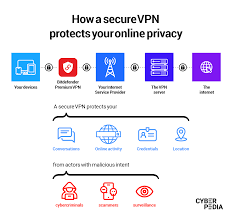Is VPN Safe to Use?
Virtual Private Networks (VPNs) have become increasingly popular for those seeking to enhance their online privacy and security. But are VPNs really safe to use? Let’s explore the safety aspects of using a VPN:
Encryption
One of the key features of a VPN is its ability to encrypt your internet traffic. This means that your data is scrambled and protected from prying eyes, such as hackers or government surveillance. As long as the encryption standards used by the VPN provider are strong, your data should remain secure.
No-Logs Policy
Many reputable VPN providers have a strict no-logs policy, meaning they do not keep any records of your online activities. This adds an extra layer of privacy protection, as even if someone were to request information about your browsing habits, there would be no data to hand over.
Secure Protocols
VPNs use various protocols to establish a secure connection between your device and the VPN server. Protocols like OpenVPN and IKEv2 are known for their strong security features. It is important to choose a VPN provider that offers robust protocols to ensure a safe connection.
Trustworthy Providers
The safety of using a VPN also depends on the reputation and trustworthiness of the provider. It is essential to research and select a reputable VPN service with a history of protecting user privacy and maintaining high security standards.
Conclusion
In conclusion, when used correctly and with a reliable provider, a VPN can be a safe tool for enhancing your online security and privacy. By encrypting your data, implementing strict no-logs policies, using secure protocols, and choosing trustworthy providers, you can enjoy the benefits of using a VPN while staying safe online.
Five Essential Tips for Safely Using a VPN in the UK
- Choose a reputable VPN provider with a clear privacy policy.
- Ensure the VPN uses strong encryption protocols like OpenVPN or IKEv2.
- Avoid free VPN services that may compromise your data for profit.
- Enable the kill switch feature to prevent data leaks if the VPN connection drops.
- Regularly update your VPN software to patch any security vulnerabilities.
Choose a reputable VPN provider with a clear privacy policy.
When considering the safety of using a VPN, it is crucial to select a reputable provider with a transparent privacy policy. By choosing a VPN service that clearly outlines how they handle user data and their commitment to safeguarding privacy, you can ensure that your online activities remain secure and protected. A reputable VPN provider with a clear privacy policy demonstrates a commitment to user confidentiality and can be trusted to prioritise your online security.
Ensure the VPN uses strong encryption protocols like OpenVPN or IKEv2.
When considering the safety of using a VPN, it is crucial to ensure that the VPN employs robust encryption protocols such as OpenVPN or IKEv2. These protocols are known for their strong security features, providing a secure connection between your device and the VPN server. By using encryption protocols like OpenVPN or IKEv2, you can enhance the protection of your data and online activities, ensuring a safer and more private browsing experience.
Avoid free VPN services that may compromise your data for profit.
When considering the safety of using a VPN, it is crucial to avoid free VPN services that may compromise your data for profit. While free VPNs may seem appealing due to their cost-free nature, many of them make money by selling user data to third parties or displaying ads. This compromises the very reason for using a VPN – to enhance privacy and security. Opting for a reputable paid VPN service ensures that your data remains secure and that your online activities are not exploited for financial gain.
Enable the kill switch feature to prevent data leaks if the VPN connection drops.
Enabling the kill switch feature on your VPN is a crucial step in ensuring your online safety and privacy. This feature acts as a failsafe mechanism that automatically cuts off your internet connection if the VPN connection drops unexpectedly. By doing so, it prevents any data leaks that could occur during the transition from a secure VPN tunnel to an unsecured connection. With the kill switch enabled, you can have peace of mind knowing that your sensitive information remains protected even in the event of a VPN disruption.
Regularly update your VPN software to patch any security vulnerabilities.
To ensure the safety of using a VPN, it is crucial to regularly update your VPN software. By keeping your VPN software up to date, you can patch any security vulnerabilities that may be present. Updates often include fixes for known issues and vulnerabilities, strengthening the overall security of your VPN connection. By staying proactive in updating your VPN software, you can enhance the protection of your online activities and data privacy.

